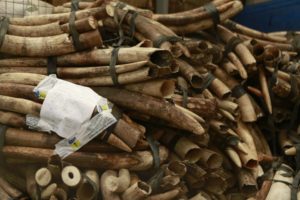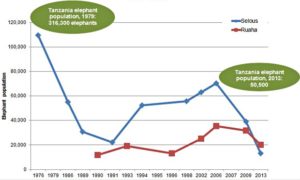
The allegations come from a scathing report on the country’s illegal wildlife trade by the Environmental Investigation Agency (EIA).
According to the report, a Chinese delegation that accompanied Xi Jinping, the President of the People’s Republic of China, to Tanzania last year purchased massive amounts of illegal elephant ivory, causing the market price of the resource to skyrocket to $700 per kilogram.
That price is double what the cost would have been prior to the alleged illegal sales.
Meanwhile, Chinese demand for ivory is causing poaching of the giant beasts to skyrocket as well.
From 2006 to 2013, the country’s elephant population has dropped from 70,000 to a mere 13,000, according to the EIA’s report.
EIA campaigners say they are positive that they know who the culprits are.
The report cites several times in the past that China has used illegal methods to rob African countries of their resources.
China’s foreign ministry spokesman, Hong Lei, says there is no substance to the allegations.
Lei said the ministry is “strongly dissatisfied” with the accusations and claims that China has been a long time supporter of protecting wild life.
“We attach importance to the protections of wild animals like elephants,” Lei said during a press briefing on Thursday. “We have been cooperating with other countries in this area.”
EIA campaigners aren’t buying it.
The group insists that Jinping’s entourage purchased “thousands of kilos of ivory” before sending the load back to China.
As the report explains, this is far from the first time Chinese nationals have targeted the country’s ivory.
Back in December of 2013, Chinese national Yu Bo was detained when he was caught trying to send 81 elephant tusks to officers from a Chinese naval force.
Bo was able to pass through one checkpoint by paying a bribe of roughly $20,000.

Just a month before that, three more Chinese nationals were arrested at a house in suburb of Dar es Salaam.
The three men had managed to gather more than 700 tusks.
“The report shows clearly that without a zero tolerance approach the future of Tanzania’s elephants and its tourism industry are extremely precarious,” said Mary Rice, executive director of the EIA. “The ivory trade must be disrupted at all levels of criminality, the entire prosecution chain needs to be systematically restructured, corruption rooted out and all stakeholders, including communities exploited by the criminal syndicates and those on the frontlines of enforcement, given unequivocal support.”
Chinese demand of the ivory has cause more ivory to come out of Tanzania than any other African country.
Unfortunately, rangers at the Sealous reserve in Tanzania are unable to catch most of the poachers because the reserve is understaffed and under funded.
Back in 2005 more than $2 million went to the reserve but that amount dropped to a mere $0.8 million by 2009.
Rangers in the area are also expected to keep an eye on over 65 square miles of land while the average area suggested for rangers to patrol at the reserve is only 10 square miles.

